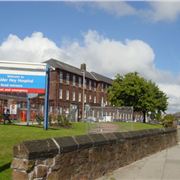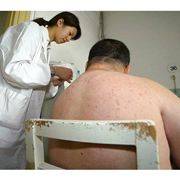Live in some parts of Liverpool and you'll pop your clogs (assuming you can still afford them) more than eight years before the rest of your countrymen.
Men in a number of districts, including Kirkdale and Riverside, will be lucky if they hit the Biblical three score years and ten.
It is clear to me many of the health inequalities
in parts of Liverpool are linked to low income, struggling to survive on various benefits and generations of unemployment
In some areas, more than half of the people are obese and there are whole streets of families living in poverty. Heart and lung diseases and cancers are rife.
Even bleaker: medical staff from Liverpool's Alder Hey Children's Hospital said in 2010 that the huge growth in the number of avoidable health complaints, such as obesity, tooth decay, alcohol abuse and those associated with passive smoking, could lead to a generation dying before their parents.
 Alder Hey HospitalWhat would Charles Dickens make of these grim statistics of life for many in 21st century Liverpool?
Alder Hey HospitalWhat would Charles Dickens make of these grim statistics of life for many in 21st century Liverpool?
Are we, though, on the dawning of a new age where the communities of Liverpool are all working together in a city which is more equal, well and green?
The council and NHS-backed Decade of Health and Wellbeing is organising a “Health-Factor” awards scheme showing how individuals are embracing positive action and real purpose.
Good luck to them, but their ambitions remind me of a comment I wrote way back in the 1990s. The city decided to join a World Health Organisation campaign, headlined Health for All by the Year 2000: “Change the 2 to a 3 and you may be in with a fighting chance,” I said.
Later, I was drafted onto a Liverpool Health is Wealth commission, launched by the University of Liverpool. The stark facts and statistics for the city, showered upon the commissioners, made me realise my earlier remarks were a little on the optimistic side.
While initiatives such as Decade of Health and Wellbeing, with its cheery logo, are to be welcomed, the project can't even scratch the surface of the health problems over vast areas of Liverpool.
It is clear to me many of the health inequalities in parts of Liverpool are linked to low income, struggling to survive on various benefits and generations of unemployment. The number of working age people officially listed as economically inactive is very high in Liverpool.
Look at Kirkdale: 14,300 people living in one of the most deprived areas in the country, over half of the children living in poverty. People suffering twice the England average for killer heart and lung diseases.
Head down the road to Riverside ward and life expectancy for males is just over 69, compared to an all-England life expectancy for males of almost 80.
What is obviously needed is a massive programme, with huge resources providing education about health and wellbeing starting in primary schools, continuing into secondary education. But would that be enough on its own?
There are now families in Liverpool where four generations are unemployed. It's partly linked to Liverpool's one time reliance on so-called unskilled labour to serve the area's manufacturing base.
 The disappearance of the big factories which employed thousands is still taking its toll.
The disappearance of the big factories which employed thousands is still taking its toll.
When I lived in Asia my home overlooked a large primary school where the day started in the school yard with every child happily doing exercises. Throughout the day the adjoining sports fields were the busiest classrooms, as all manner of sports activities took place.
Even if a city-wide health campaign started in the schools, it would still be some years before the tide started to chance.
Meanwhile Liverpool will continue to wear its badge as one of the most socially deprived and unhealthy areas of the UK, with some parts of the city among the worse in Europe.
Yes, a health awareness programme is needed for the young, but while we are talking about health and wellbeing, we need to dramatically increase educational attainment and aspiration too.
Somebody (can it be our upcoming city mayor?) has to break this vicious social cycle.














